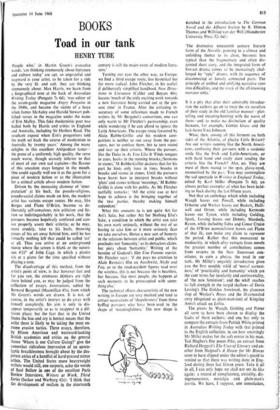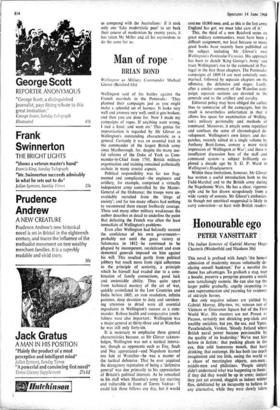Toad in our tank BOOKS
HENRY TUBE
People who,' in Martin Green's evocative words, 'are thinking strenuously about literature and culture today' are apt, so ungrateful and wayward is your artist, to be taken for a ride by the very lit. and cult. they are thinking strenuously about. Max Harris, we learn from a biographical note at the back of Australian Writing Today (Penguin 7s 6d), 'was editor of the avant-garde magazine Angry Penguins in the 1940s, and became the victim of a hoax when James McAuley and Harold Stewart pub- lished verses in the magazine under the name of Ern Malley. This fake ffiodernistic poet was hailed both by Harris and critics in England and Australia, including Sir Herbert Read. The resultant exposé when Ent's progenitors told the truth set back the course of modernism in Australia by twenty years.' Among the many delights in this excellent Antipodean taster— the prose of a uniformly high quality, the verse much worse, though scarcely inferior to that of most of our own sad captains—the flavour of this anecdote stays longest in the mouth. One could equally well use it as the germ'for a piece of modern fiction or as the illustration for a critical article about modern fiction.
Driven by the increasing clamour of 'inter- pretation' at his back, the pseudo-religious, pseudo-social claims made on him, the modern artist has various escape routes. He may, like Borges and Mann O'Brien, become so de- liberately self-conscious, mix criticism and fic- tion so indistinguishably in his work, that the pursuers become hopelessly confused and can- not properly assert their criteria; or he may, more crudely, take to his heels, throwing pieces of his art away behind him, until he has virtually nothing left that could be called 'art' at all. Thus you arrive at an underground movie where the screen is blank or the notori- ous 4'33" of John Cage. in which a pianist sits at a piano for the time specified without playing a note.
The disadvantage of this method, from the artist's point of view, is that however fast and far you run, the strenuous thinkers are right there behind you, as may be judged from the collection of essays, Innovations, edited by Bernard Bergonzi (Macmillan 45s), from which Mr Green's words are drawn. It is not, of course, in the artist's interest to do away with himself completely, his aim is only to dis- appear temporarily so as to reappear in a dif- ferent place; but the fact that in the United States the hue- and cry is hottest means that the artist there is likely to be taking the most ex- treme evasive tactics. These essays, therefore, by fifteen American and westward-looking British academics and critics on the general theme 'Where is our Culture Going?' give the somewhat ridiculous impression of an apoca- lyptic breathlessness brought about by the des- perate antics of a handful of hard-pressed minor artists. The United States more heavyweight writers would still, one suspects, echo the words of Saul Bellow in one of the excellent Paris Review Interviews, Writers at Work, Third Series (Seeker and Warburg 42s): 'I think that the development of realism in the nineteenth century is still the major event of modern litera- ture.
Turning our eyes the other way, to Europe, we find a third escape route, less hysterical but far more radical. John Fletcher, in his useful, if deliberately simplified handbook New Direc- tions in Literature (Calder and Boyars 40s). locates 'much of the truly exciting work towards a new literature being carried out at the pre- sent time' in France. After the irritating in- accuracy of some references made to French writers by Mr Bergonzi's consortium, one can only warm to Mr Fletcher's partisanship, even while wondering if he can afford to ignore the Latin Americans. The escape route favoured by Alain Robbe-Grillet and his modern com- patriots is neither to run away from the pur- suers, nor to confuse them, but to turn round and tear up their criteria. Where the pursuer, like the Duke in As You Like It `Finds tongues in trees, books in the running brooks,/Sermons in stones,' M Robbe-Grillet declares that for his part he finds only trees in trees, brooks in brooks and stones in stones. Until the pursuers have learnt how to interpret brooks without `plots' and stone's without 'meanings,' M Robbe- Grillet is alone with his public. As Mr Fletcher tactfully remarks: 'All the critic can at best hope to 'achieve is the bringing together of the two parties, thereby making himself redundant.'
What this amounts to is not quite Art for Art's Sake, but rather Art for Nothing Else's Sake, a condition in which the artist can take his own work seriously, without the rest of us having to take him or it more seriously than we take ourselves. Hence a new sort of honesty in the relations between artist and public, which precludes not 'humanity,' as its detractors claim, but piety about 'humanity.' Writing of the heroine of Godard's film Une Feninze mariee, Mr Fletcher says: If she pays no attention to Alain Resnais's film on Auschwitz, Night and Fog, or to the road-accident figures read over the wireless, this is not because she is heartless, but because, like most people, she happens at such moments to be preoccupied with some- thing else.'
The technical effects characteristic of the new writing in Europe are very marked and tend to attract accusations of 'shapelessness' from those baffled pursuers who have been used to the shape of 'meaningfulness.' The new shape is
sketched in the introduction to The German Novel and the Affluent Society by R. Hinton Thomas and Wilfried van der Will (Manchester University Press 32s 6d): 'The distinctive nineteenth century literary form of the Novelle, growing to a climax and unfolding thence to its close, becomes less typical than the fragmentary and often dis- jointed short story, and the integrated form of five-act drama comes to be increasingly chal- lenged by "epic" drama, with its sequence of disconnected or loosely connected parts. The principle of unified and unifying narrative runs into difficulties, and the stock of the all-knowing narrator sinks.
It is a pity that after their admirable introduc- tion the authors go on to treat the six novelists of their study in the old,familiar manner—plot- telling and meaning-hunting with the worst of them—and to make no distinction of quality between, for example, Gunter Grass and the lack-lustre Uwe Johnson.
What, then, among all this ferment on both sides of the Atlantic, of plucky Little Britain? Are our writers running like the North Ameri- cans, confusing their pursuers with a sardonic smile like the Irish and Latin-Americans, - or with hard hand and steely stare rending the criteria like the French? Alas, no. They are most of them rooted to the spot, glassy-eyed, mesmerised by the past. You may contemplate the sad spectacle in Writing in England Today, edited by Karl Miller (Penguin 7s 6d), an almost perfect exemplar of what has been hold- ing us back during the last fifteen years.
Not that an anthology which while including Waugh leaves out Powell, while including Osborne and Wesker leaves out Beckett, Halli- well and Orton, while 'including Kennode leaves out Tynan, while including Golding, Spark, Lessing leaves out Dennis, Murdoch, Raven, while including Edna and Conor Cruiims of the O'Brien nomenclature leaves out Plants of that ilk, can make any claim to represent the period. Rather that this monument to mediocrity, in which after extracts from novels the greatest number of contributions comes from reviews in the New Statesman con- stitutes, to coin a phrase, the toad in our tank. Mr Miller's ungainly introduction gives you the first mouldy whiff of 'moral earnest- ness,' of 'practicality and humanity' which are the cant terms for insularity and sentimentality, of 'the new feminism'; and the whiff reaches its full strength in the turgid shallows of Doris Lessing's The Golden Notebook, the glaucous slop of Wesker's Roots and the ill-concealed envy (disguised as plain-man-ism) of Kingsley Amis's attack on Lolita.
The pieces by Waugh, Golding and Pinter all seem to have been chosen to display the faults of these authors; and' one has only to compare the extracts from Patrick White printed in Australian Writing Today with that printed in the English collection, to see how unerringly Mr Miller makes for the soft centre in his man. Ted Hughes's fine poem Pike, an extract from Richard Hoggart's The Uses of Literacy and an- other from Naipaul's A House for Mr Biswas seem to have slipped under the editor's guard to remind us that there was writing done in Eng- land during these last fifteen years. Take it all in all, I can only hope we shall not see its like again: a record of complacency, triviality, dis- ingenuousness, nostalgia and plain-man's inertia. We have, 1 suppose, one consolation, as compared with the Australians : if it took only one 'fake modernistic poet' to set back their course of modernism by twenty years, it has taken Mr Miller and all his myrmidons to do the same for us.











































 Previous page
Previous page